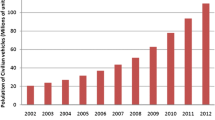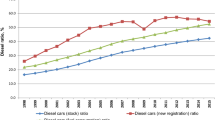Abstract
Since 1978 the Federal government has regulated the fuel economy of new cars sold in the United States. The purpose of Corporate Average Fuel Economy (CAFE) standards is to lessen the national dependence on foreign oil. Through the use of theoretical and empirical models this paper examines the impact of CAFE standards on the automobile industry and on energy consumption. It is shown that CAFE standards may or may not save energy. If CAFE does save energy, it does so at a prohibitive cost to the economy. CAFE standards are also shown to have a number of perverse impacts on the automobile industry as well as consumers.
Similar content being viewed by others
References
Berkovic, J. 1985. “New Car Sales and Used Car Stocks.” Rand Journal of Economics 16:195–214.
Blair, R.D., D.L. Kaserman, and R.C. Tepel. 1984. “The Impact of Improved Mileage on Gasoline Consumption.” Economic Inquiry 22:209–217.
Bohi, D.R. 1981. Analyzing Demand Behavior: A Study of Energy Elasticities. Johns Hopkins, Baltimore.
Congressional Budget Office. 1982. Domestic Content Legislation and the U.S. Automobile Industry. Subcommittee on Trade of the House Committee on Ways and Means.
Council of Economic Advisers}. 1985. “Impact of the Japanese Automobile Voluntary Restraint Agreement.” Mimeo, Washington, D.C.
Crandall, R.W. 1984. “Import Quotas and the Automobile Industry.” The Brookings Review 2:8–16.
Crandall, R.W. 1985. “Why Should We Regulate Fuel Economy At All? The Brookings Review 3:3–8.
Crandall, R.W., and J.D. Graham. 1989. “The Effect of Fuel Economy Standards on Automobile Safety.” Journal of Law and Economics 32:97–118.
Crandall, R.F., H.K. Gruenspecht, T.E. Keeler, and L.B. Lave. 1986. Regulating the Automobile. The Brookings Institution, Washington, D.C.
Federal Trade Commission. 1988. Comments of the Staff of the Bureau of Economics Before the National Highway Safety Administration, re: Passenger Automobile Average Fuel Economy Standards for Model Years 1989 and 1990, 49 CFR Part 531.
Friedlander, A.F., C. Winston, and K. Wang. 1982. “Costs, Technology, and Productivity in the U.S. Automobile Industry.” Bell Journal of Economics 13:1–20.
Godek, P.E. 1989. The Corporate Average Fuel Economy Standard: 1978–1988. Mimeo. Economists Inc., Washington D.C.
Gruenspecht, H.K. 1982. “Differential Regulation: the Case of Auto Emissions Standards.” American Economic Review 72:328–331.
Gruenspecht, H.K. 1982b. “Differentiated Regulation: A Theory with Applications to Automobile Emissions Controls.” Yale University Ph.D. Dissertation.
Henderson, D.R. 1985. “The Economics of Fuel Economy Standards.” Regulation, 9:45–48.
Hess, A.C. 1977. “A Comparison of Automobile Demand Equations.” Econometrica 45:680–701.
Irvine, F.O. Jr. 1983. “Demand Equations for Individual New Car Models.” Southern Economic Journal 50:764–782.
Kleit, A.N. 1987. “The Economics of Automobile Fuel Economy Standards.” Yale University Ph.D. dissertation.
Kleit, A.N. 1988. “The Effect of Automobile Fuel Economy Standards.” Federal Trade Commission Working Paper No. 160.
Kleit, A.N. 1988b. “Enforcing Time-Inconsistent Government Regulations.” Federal Trade Commission Working Paper No. 161.
Kwoka, J.E. Jr. 1983. “The Limits of Market Oriented Regulatory Techniques: The Case of Automotive Fuel Economy.” Quarterly Journal of Economics 97:695–704.
Langenfeld, J.A., and M.C. Munger. 1985. The Impact of Federal Automobile Emissions Standards. Mimeo, Federal Trade Commission, Washington D.C.
Parks, R.W. 1977. “Determinants of Scrappage Rates for Postwar Vintage Automobiles.” Econometrica 45:1099–1115.
Rogers, R.P. 1986. The Short-Run Impact of Changes in the Corporate Average Fuel Economy Standards. Mimeo, Federal Trade Commission, Washington, D.C.
Stucker, J.P., B.K. Burright, and W.E. Mooz. 1980. “Evaluating Fuel Economy Mandates.” A Rand Note N-1005.
Ward's Automotive Yearbook. 1988. Ward Publishing, Detroit.
White, L.J. 1971. The Automobile Industry Since 1945. University Press, Cambridge MA.
Yandle, Brace. 1980. “Fuel Efficiency by Government Mandate: A Cost-Benefit Analysis.” Policy Analysis 6:291–304.
Author information
Authors and Affiliations
Rights and permissions
About this article
Cite this article
Kleit, A.N. The effect of annual changes in automobile fuel economy standards. J Regul Econ 2, 151–172 (1990). https://doi.org/10.1007/BF00165931
Published:
Issue Date:
DOI: https://doi.org/10.1007/BF00165931




